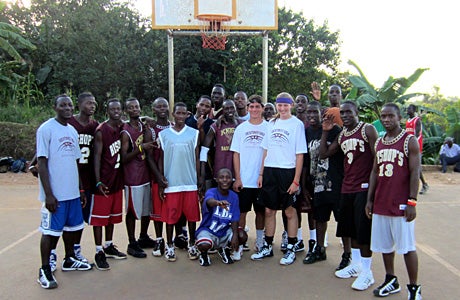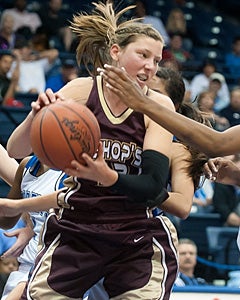
Roeper, Lock and some of the players that participated in the clinics last summer in Mukono, Uganda.
Courtesy photo
The group hosted two daily clinics for up to 125 youngsters ranging in age from 6-15, and another for approximately 30 older players. It was the desire of these uber-athletic young men that impressed Devon Roeper.
"To teach these 20-year-old guys who were so intent and they wanted to learn was remarkable to me," said Roeper. "The way they play basketball there, they're much more physical. They can run for hours in the hot Uganda sun. It was 90 to 100 degrees and they would keep playing for five hours without water breaks. They wanted to keep on playing. You couldn't take the ball out of their hands."
Peng, who played her high school basketball at
Westview in San Diego, said on her NYU basketball profile page that she was inspired by the Phenom teams because "they showed me that it's bigger than basketball and reminds me of why I play."
The highly decorated Roeper, who carries a 4.08 GPA, is Bishop's all-time leading scorer and rebounder. She was nominated for the McDonald's All American team. She's all-everything: division, league and California Interscholastic Federation. Despite having the credentials, the 6-foot-3 Roeper, who's averaging 17.8 points and 11.5 rebounds per game this season, wasn't sure how she would be received by the young men. She was aware of the attitude that girls are not as valued as boys in Uganda.
"At first I was a little nervous about that," she said. "I was wondering if they were actually even going to listen to me."

Devon Roeper playing for Bishop's in last
year's CIF championship game against La
Jolla Country Day.
Courtesy photo
But it didn't take long for Roeper, who will be playing Division I basketball at Columbia where she plans on studying international relations, to demonstrate her knowledge of the game.
"It took just a few minutes for me to show them a cool post move for them to pay attention to me the rest of the week," she said. "They wanted to soak up everything they could. Even on breaks they would come up to ask me to teach them more and more and more. It only took them a few minutes to realize they could learn something from me. Once they realized that, they were the most attentive people I've seen."
Roeper and Lock got an assist with the addition of the 6-foot-11 Laue, who was born with one arm. He was an example to the other players of how to overcome adversity.
"Kevin was a great asset to the trip," said Roeper. "The guys really bonded with him ... A lot of the guys found his story inspirational. They trusted him and wanted to learn more from him."
Lau's story was depicted in the documentary "Long Shot: The Kevin Laue Story." It premiered in October in New York.
"Helping coach in Uganda was truly one of the best experiences I've ever had," said Laue. "What (they) did for the locals there, by raising money to build a court, will have a lasting effect on their community."
Roeper and others are planning another trip back to Uganda this summer. They're raising money this school year in hopes of installing lights and bleachers during their next trip. But Roeper and Lock want the project to continue beyond the court and into the classroom. And they want it to continue beyond their graduation from high school.
They would like to see U.S. high school and college athletes partner with team members in Uganda. Roeper and Lock want a player or team here to sponsor a player there financially as a means of furthering their education. They plan on launching a Facebook page to raise funds to provide secondary and university-level schooling and vocational training for the female and male Phenom players.
"I want to leave a legacy," Roeper said. "I want San Diego to be able to embrace this project, as well as the Ivy League next year. This project has no limits of what it could do. My next goal is to provide education and use basketball as a tool to find those in the community who need help getting a job or getting university education and to provide that to them. I want this to be a high school, grass-roots fundraising operation, and not just led by adults. When I go to college I want this to outlast me in San Diego. I want the teams to continue to support the players and not just have the project end when I leave."
